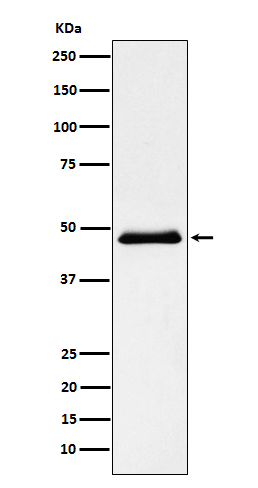
| WB | 1/1000-1/2000 | Human,Mouse,Rat |
| IF | 咨询技术 | Human,Mouse,Rat |
| IHC | 1/100-1/200 | Human,Mouse,Rat |
| ICC | 技术咨询 | Human,Mouse,Rat |
| FCM | 咨询技术 | Human,Mouse,Rat |
| Elisa | 咨询技术 | Human,Mouse,Rat |
| Aliases | Pancreatic lipase; PL; PNLIP; PNLIPD; PTL;;Pancreatic lipase |
| WB Predicted band size | Calculated MW: 51 kDa ; Observed MW: 49 kDa |
| Host/Isotype | Rabbit IgG |
| Antibody Type | Primary antibody |
| Storage | Store at 4°C short term. Aliquot and store at -20°C long term. Avoid freeze/thaw cycles. |
| Species Reactivity | Human |
| Immunogen | A synthesized peptide derived from human Pancreatic lipase |
| Formulation | Purified antibody in PBS with 0.05% sodium azide,0.05% BSA and 50% glycerol. |
+ +
以下是关于Pancreatic Lipase (PNLIP)抗体的3篇参考文献,按文献内容简要概括:
1. **"Monoclonal antibodies against human pancreatic lipase: production and characterization"**
- 作者:Lowe ME, et al.
- 摘要:该研究报道了针对人胰腺脂肪酶(PNLIP)的单克隆抗体制备及特性分析,验证了抗体对酶活性的抑制作用及其在免疫检测中的应用潜力。
2. **"Development of a specific ELISA for pancreatic lipase using monoclonal antibodies"**
- 作者:Sato T, et al.
- 摘要:研究团队开发了一种基于单克隆抗体的ELISA检测方法,用于高灵敏度、高特异性地定量检测血清中的PNLIP,为胰腺炎诊断提供新工具。
3. **"Antibody-based inhibition of pancreatic lipase reduces dietary fat absorption in vivo"**
- 作者:Kok RG, et al.
- 摘要:通过动物实验证明,靶向PNLIP的抗体能有效抑制肠道脂肪酶活性,减少膳食脂肪吸收,为肥胖治疗策略提供了实验依据。
注:以上信息为示例性内容,实际文献需通过PubMed或SciFinder等学术数据库检索。如需具体文献,建议补充研究领域关键词(如诊断、治疗或分子机制)以便精准推荐。
Pancreatic lipase (PNLIP) is a critical digestive enzyme produced by the pancreas, primarily responsible for hydrolyzing dietary triglycerides into free fatty acids and monoglycerides in the small intestine. As a key component of lipid digestion, PNLIP requires bile salts and colipase for optimal activity. Antibodies targeting PNLIP are valuable tools in research and diagnostics, enabling the detection and quantification of the enzyme in biological samples. These antibodies (polyclonal or monoclonal) are widely used in techniques like ELISA, Western blotting, and immunohistochemistry to study pancreatic function, enzyme secretion, and pathologies such as pancreatitis, cystic fibrosis, or pancreatic cancer.
Elevated PNLIP levels in blood often indicate acute pancreatitis, while reduced activity may signal chronic pancreatic insufficiency. Additionally, PNLIP inhibitors (e.g., orlistat) are used clinically to manage obesity, making its study relevant to metabolic disorders. Antibodies against PNLIP also aid in investigating enzyme structure-function relationships, substrate interactions, and regulatory mechanisms. Their specificity helps distinguish PNLIP from other lipases, ensuring accurate experimental outcomes. Overall, PNLIP antibodies play a pivotal role in advancing both basic research and clinical applications related to pancreatic health and lipid metabolism.
×